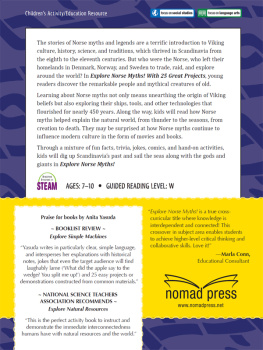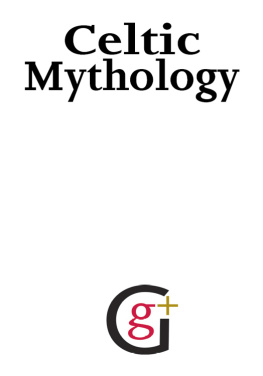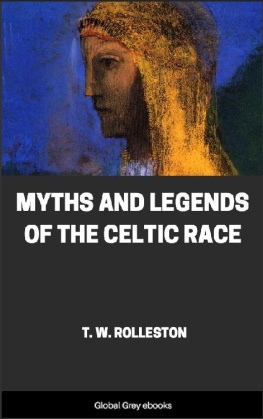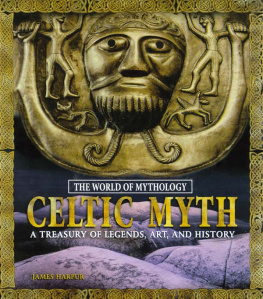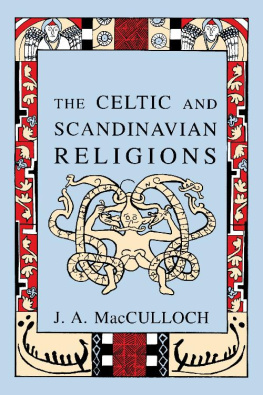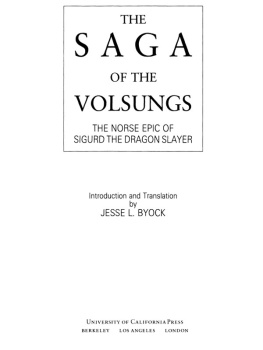Bibliographical Note
This Dover edition, first published in 2004, is an unabridged republication of the text of the work originally published in 1907 by the Norrna Society, London, as Romances and Epics of our Northern Ancestors / Norse, Celt and Teuton / Translated from the works of Dr. W. Wgner / With introduction by W. S. W. Anson, which formed Volume 12 of the Norrna Anglo-Saxon Classics (Royal Edition) / Hon. Rasmus B. Anderson, LL.D., Editor in Chief / J. W. Buel, Ph.D., Managing Editor. An earlier publication credits the translation to M. W. Macdowall.
Library of Congress Cataloging-in-Publication Data
Wgner, Wilhelm, 18001886.
Great Norse, Celtic, and Teutonic legends / Wilhelm Wgner ; introduction by W.S.W. Anson.
p. cm.
Originally published: Romances and epics of our northern ancestors, Norse, Celt and Teuton. London, New York [etc.] Norrna Society, 1906, in series:
Norrna, the history and romance of northern Europe.
9780486117461
1. Romances. 2. Literature, Medieval. I. Title.
PN683.W3 2004
839.5dc22
2003068770
Manufactured in the United States of America
Dover Publications, Inc., 31 East 2nd Street, Mineola, N.Y. 11501
CHRIEMHILD DENOUNCES HAGEN AT THE BIER OF SIEGFRIED .
( After the painting by Emil Lauffer. )
M any painters have used Chriemhilds (Kriemhild) denunciation of Hagen as the subject of their greatest efforts, since the incident, aside from its tragic and pity-compelling character, involves accessories colorful as they are dramatic. The legendary killing of Siegfried, and the leading up to that foul deed, has an allegoric significance, for the events may be taken to represent the transition from Paganism to Christianity. The artist conceiving this higher meaning, has therefore chosen to bring these opposing powers into his picture, grim Hagen typifying the former, while the murdered Siegfried, at the feet of a crucified Saviour, clasps the symbol of the faith that triumphs in death.
See page 140
Introduction.
LEGEND IS not history; but in legend we find embodied historical truths, manners and customs of past ages, beliefs and superstitions otherwise long forgotten, of which history itself takes no account. Legend has preserved for us, maybe in romantic dress, maybe under altered names and circumstances, stirring pictures of heroes and heroines, who once have lived and suffered, fought and conquered, or have faced death with trustful courage; pictures, too, of men of equal prowess, as strong in evil as in might, who, victorious for a time, have yet ever met a stronger power than theirs, stronger in virtue, stronger in might.
As we write, the shadowy forms of terrific Alboin raising aloft his goblet fashioned from royal skull; the noble Siegfried with his loved Chriemhild and the jealous Brunhild; brave King Dietrich; the gentle, patient Gudrun and her beauteous mother Hilde, all flit before the mind, framing themselves into a vivid picture, such as must have lived in the imagination of our early forefathers, stirring them on to noble actions, restraining them from evil working. Thus has good in all ages fought against ill, and all races of men have sung its victory in strains but slightly varying. And so will it ever fight, no matter how our more elaborate ideas of what is good or evil may vary; the nation always glorifies the great and noble according to its own unreasoning reason.
This volume contains the principal hero-lays of the six great epic cycles of the Teutonic Middle Ages. Beside these French poems, stand the Breton ones of King Arthur and his Knights of the Round Table, which later on took up the legend of the Holy Grail into their very heart, and at this period found their way to Germany, where they met with a more romantic and poetic treatment at the hands of the court minnesingers. But these foreign importations never found a true home amongst the German people; they never became popular . The native hero-lays on the other hand, even though less beautiful in conception and in form, lived on through centuries, and even to this day exist, though disguised and degraded. For in the market-places of Germany, and at the few old English fairs that yet remain, the pedlar bookseller gives in exchange for the farthing piece printed versions of many of these old legendary tales: Siegfrieds battle with the Dragon, the Rose-garden, Alberich and Elbegasts adventures, and other wondrous histories of Teutonic epical origin. But this literature is fast dying out, if, indeed, it may not by this time be said to be already dead. In Iceland, however, and in the Faroe Isles, tradition still holds her throne unconquered. She yet sings to the listening grey-beards, to the men and women, and to the growing youth, of Odin and his mighty rule, of Honer and the wicked Loke, of Thor and Frey, and Freyja Queen of Heaven, of the Fenriswolf and the Midgard-serpent. In the long winter nights she still tells of bold Sigurds (Siegfried) deeds and battle, of Gudruns faithful love and dumb grief beside the body of her lord, of Gunnars marvellous harping in the garden of snakes, and the listeners hold it all in their memory, that they may sing and tell it to their children and their childrens children. And so do they cherish the time-old legends of their fathers, that the ardent youth may still he heard to adjure his bride to love him with the love of Gudrun, the master revile his dishonest workmen as false as Regin (the evil dwarf), and the old men to shake their heads and say of the daring lad, that he is a true descendant of the Wolsungs. At the dance, Sigurd-songs are yet sung, at Christmastide a grotesque Fafner takes his part in the mummery. Thus old German tradition in her wane has found an asylum, perhaps a last resting-place, in the far North, driven from their first home by strangers, the myths of Greece and Rome. Every schoolboy can tell of Zeus and Hera, of Achilles and Odysseus, every schoolgirl of the golden apples of the Hesperides, of Helen, of Penelope; yet to how many of our older folks, even, are the grand forms of Siegfried, Chriemhild, and Brunhild more than mere names?
It is true that a tendency is now springing up in England and in Germany once more to enquire into these old tales, nay beliefs, of our common ancestry. It is true that we have a Morris and they a Wagner; but we should wish to see the people of both nations take a more general interest in a subject of such intrinsic worth to them, their long-forgotten heritage. It is not the history of class-books that they will find in itit is that of their fathers manners and customs, of their joys and sufferings, their games and occupations, festivals and religious observances, battles, victories and defeats, their virtues and their crimes. Such is the golden field that lies beneath our feet, which, unheeded, we have let lie fallow, till it has almost faded from memory.
To what extent these legends formed a part of their religion proper it is impossible for us now to say. Of later origin and more poetic treatment, they stood in a similar position towards the old Teutons as the later Greek heroic legend stood to the Greeks of history. Some say, and the learned Grimm amongst them, that the heroes were historical men raised to the dignity of gods, others that they were humanized gods themselves; but may be neither theory is exactly true, though both contain a portion of the truth. In the hero-legends we certainly find heroes possessed of the distinctive attributes of certain gods, and we are tempted to add others to their characters, but we consider that these divine qualities were looked upon rather as divine gifts of the gods, and did not thereby exactly deify the recipients. It was similar with the Greeks, and perhaps with all nations at a stage when their heroes really formed an essential element in their belief. The gods were never human heroes, the heroes never became gods, though each approached the other so nearly that we are often misled into assuming that they were identical.





